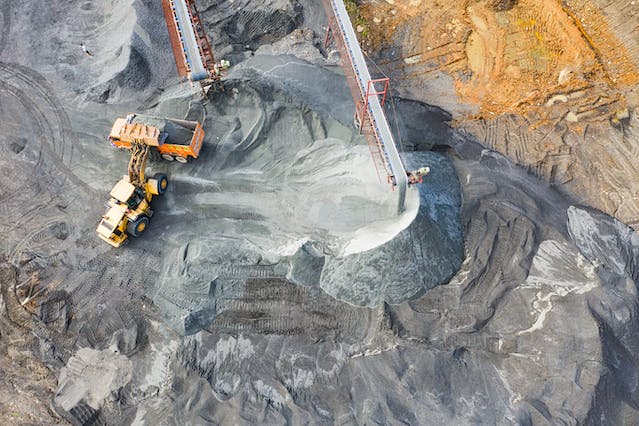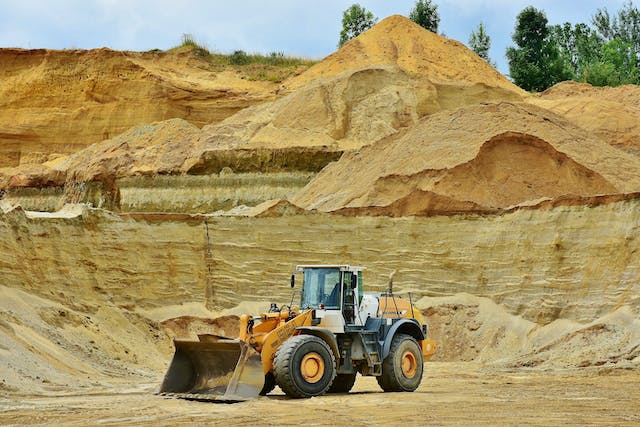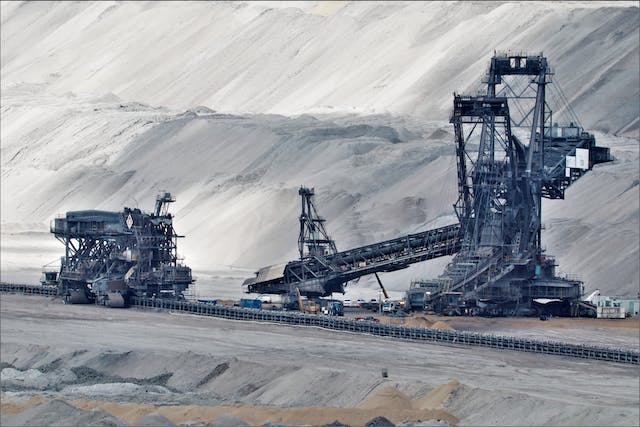Are you considering a career in the mining and quarrying industry? It’s important to understand the unique challenges and opportunities that come with this field. Mining and quarrying of nonmetallic minerals (no fuels) involves extracting and processing materials such as limestone, gypsum, and potash.
This industry plays a crucial role in providing essential materials for construction and manufacturing, but it also comes with its own set of potential hazards and risks. The demand for these materials remains steady, making it a viable career path for those with the right skill set and mindset.
While the work in mining and quarrying can be physically demanding and potentially dangerous, it also offers the opportunity to work in a dynamic and rewarding environment. You’ll have the chance to operate heavy equipment, develop specialized technical skills, and contribute to important infrastructure projects.
The industry also offers a range of career advancement opportunities and paths for personal and professional growth. Whether you’re considering a career as a heavy equipment operator, a geologist, or a safety manager, there are diverse and fulfilling career paths available in mining and quarrying.
Key Takeaways:
High demand
The mining and quarrying industry for nonmetallic minerals continues to experience high demand, offering stable and reliable career opportunities.
Varied Career Paths
Quarrying offers a wide range of career paths, from machine operation to management, providing opportunities for both hands-on and leadership roles.
Advancements in Technology
The mining and quarrying industry has embraced technological advancements, leading to increased efficiency, safety, and environmental sustainability.
Attractive Earning Potential
Careers in quarrying can offer attractive earning potential, with opportunities for growth and advancement within the industry.
Importance of Environmental Stewardship
As the industry continues to evolve, there is a growing emphasis on environmentally responsible practices, making it an appealing career path for those passionate about sustainability.
The Essence of Quarrying Nonmetallic Minerals

If you are considering a career in mining and quarrying of nonmetallic minerals, it is essential to understand the nature of this industry. The NAICS 212300 – Nonmetallic Mineral Mining and Quarrying includes establishments primarily engaged in developing the mine site, mining, and/or quarrying nonmetallic minerals.
Definition and Explanation of Quarrying
Quarrying is the process of extracting nonmetallic minerals from the earth’s surface. This involves the use of heavy machinery and explosives to break up large rocks and materials. The extracted materials are then processed to be used in construction, agriculture, and various industrial applications. Quarrying is a crucial part of the mining industry, providing essential materials for infrastructure and economic development.
Types of Nonmetallic Minerals Mined
There are various types of nonmetallic minerals that are typically mined through quarrying. Some of the most common minerals include limestone, gypsum, phosphate, clays, and marble. These minerals are essential in the production of construction materials, fertilizers, and other industrial products. The extraction of these minerals is a vital part of the global supply chain, contributing to economic growth and infrastructure development.
The Mining Industry: An Overview

Now, let’s take a closer look at the mining industry as a whole. The mining industry plays a crucial role in the global economy, providing essential materials for nearly every industry, from construction to manufacturing. The extraction of nonmetallic minerals (no fuels) is a significant part of the industry, contributing to the production of essential materials such as limestone, gypsum, and phosphate.
Mining Techniques for Nonmetallic Minerals
When it comes to mining nonmetallic minerals, there are several techniques that are commonly used. These include surface mining, underground mining, and solution mining. Surface mining, the most common method, involves removing the overlying rock and soil to access the mineral deposit. Underground mining, on the other hand, involves extracting minerals from deep within the earth. Solution mining is used for minerals that are dissolved in a solvent, such as salt.
Environmental Impact of Quarrying and Mining
Quarrying and mining can have a significant impact on the environment. The extraction of minerals can result in the disruption of local ecosystems, soil erosion, and the contamination of water sources. It is crucial to consider the environmental impact of these activities and to implement measures to mitigate any negative effects. Reclamation of mining sites and the implementation of sustainable mining practices are essential for minimizing the environmental impact of quarrying and mining.
Exploring A Career Path in Quarrying

To begin a career in quarrying, it is important to consider the various job roles available in the industry, the required skills and qualifications, as well as the pros and cons of pursuing this career path. By understanding these aspects, you can make an informed decision about whether quarrying is the right fit for you.
Job Roles in the Quarrying Industry
Within the quarrying industry, there are a variety of job roles available, each requiring different skill sets and levels of experience. Some common job roles include quarry manager, plant operator, maintenance technician, and geologist. As a quarry manager, you would be responsible for overseeing the operations of the quarry, managing staff, and ensuring that production targets are met.
Plant operators are responsible for operating and maintaining heavy machinery used in the extraction and processing of minerals. Maintenance technicians are crucial for the upkeep of equipment and machinery, ensuring that operations run smoothly. Geologists play a key role in identifying suitable locations for quarrying, conducting surveys, and analyzing geological data to determine the quality and quantity of minerals available.
Required Skills and Qualifications in Quarrying
In order to excel in the quarrying industry, it is essential to have a combination of practical skills, technical knowledge, and the ability to work in a challenging environment. Strong problem-solving skills, attention to detail, and the ability to work as part of a team are highly valued in this industry.
Additionally, having a relevant qualification in mining or geology can greatly enhance your prospects. Some roles may require specific certifications or licenses, particularly for operating heavy machinery or carrying out blasting operations. Continuous learning and staying updated with advancements in technology and safety regulations are also crucial for a successful career in quarrying.
Understanding the Pros and Cons of Quarrying
When considering a career in quarrying, it’s important to weigh the pros and cons to make an informed decision. Below are the key pros and cons to consider:
Pros
- Opportunities for career progression and specialization
- Competitive salaries and benefits
- Hands-on work with cutting-edge technology and equipment
- Contribution to vital infrastructure and construction projects
Cons
- Exposure to hazardous working conditions
- Impact on the environment and local communities
- Long working hours and physically demanding tasks
- Risk of accidents and injuries
Mining Your Potential – Identifying Career Opportunities
However, before diving into a career in quarrying, it’s important to gain an understanding of the various career opportunities available in this field. According to the United Nations Statistics Division, the mining and quarrying industry falls within the classification of industry ‘B – Mining and quarrying’. You can learn more about the specific details of this classification here.
Training and Growth Opportunities in Quarrying
When considering a career in quarrying, it’s essential to recognize the training and growth opportunities that are available to you. Many employers in the industry provide on-the-job training, apprenticeships, and formal education programs to help you develop the skills necessary to succeed.
You’ll have the chance to gain expertise in operating heavy machinery, using advanced technology for mineral extraction, and implementing safety protocols to ensure a secure working environment. With a continuous demand for mineral resources worldwide, the potential for growth in this industry is significant. By demonstrating strong work ethic and knowledge, you can expand your expertise and advance into leadership roles.
Career Progression and Salary Expectations
As you embark on a career in quarrying, it’s vital to understand the potential for career progression and salary expectations. With experience and continued education, you can advance into more specialized roles such as quarry manager, mineral processing plant operator, or environmental health and safety manager. The industry offers competitive salaries, and as you gain expertise, you can expect to earn a higher income.
However, it’s important to note that working in the mining and quarrying industry can be physically demanding and hazardous, so a strong commitment to safety protocols and proper training is crucial. With dedication and a proactive attitude, you can navigate a successful career path in this field.
Ensuring Sustainability in Nonmetallic Mineral Extraction

After Mining And Quarrying Of Nonmetallic Minerals, Except Fuels, it’s important to consider sustainability in the extraction process. As a quarrying professional, you have a responsibility to ensure that the extraction of nonmetallic minerals is carried out in a way that minimizes environmental impact, promotes community engagement, and prioritizes worker safety.
Sustainable Quarrying Techniques
When it comes to sustainable quarrying techniques, it’s crucial to focus on minimizing the environmental impact of mining operations. This includes implementing responsible land restoration practices, reducing water and energy consumption, and controlling air emissions. By integrating sustainable practices into your quarrying operations, you can minimize habitat destruction, soil erosion, and water pollution, ensuring that the natural environment is protected for future generations.
The Role of Technology in Quarrying Sustainability
Technology plays a crucial role in ensuring sustainability in nonmetallic mineral extraction. Advanced equipment and machinery can help to improve resource efficiency and reduce waste generation. For example, using state-of-the-art drilling and blasting technology can help minimize the environmental impact of quarrying activities, while also increasing operational efficiency.
Additionally, implementing digital monitoring and control systems can enhance worker safety, reduce energy consumption, and streamline production processes, ultimately contributing to sustainable quarrying practices.
Case Studies of Successful Careers in Quarrying

Despite the challenges that come with the quarrying profession, many individuals have found immense success and fulfillment in their careers. Here are some case studies that illustrate the potential for a successful career in quarrying:
John Smith
- After obtaining a degree in geology, John Smith began his career as a quarry manager for a large mining company. Over the years, he has worked his way up to a senior leadership position and is now responsible for overseeing multiple quarrying operations. His annual salary now exceeds $150,000, and he has been able to provide comfortably for his family while pursuing his passion for geology.
Lisa Johnson
- Lisa Johnson started her career as a heavy equipment operator in the quarrying industry. Through hard work and dedication, she has progressed to become a site supervisor, overseeing production and safety at a large quarry. She has been able to achieve financial stability and enjoys the sense of accomplishment that comes with her role.
Michael Rodriguez
- Michael Rodriguez pursued a career in quarrying after high school and completed an apprenticeship program to become a skilled driller. He now works for a reputable mining company and earns a competitive salary, with opportunities for growth and advancement in the industry.
Stories of Individuals in the Quarrying Profession
Many individuals have found fulfillment and success in the quarrying profession, whether through operating heavy machinery, managing operations, or conducting geological studies. The industry offers diverse opportunities for career growth and development, allowing you to carve out a path that aligns with your interests and strengths.
How Quarrying Improves Communities and Economies
Quarrying plays a crucial role in supporting local economies and communities. The industry creates job opportunities, stimulates economic growth, and provides essential materials for infrastructure development. Moreover, quarrying operations adhere to strict safety and environmental standards, ensuring that their impact on communities is both positive and sustainable.
Conclusion: Is Mining and Quarrying a Good Career Path?
Considering all points, quarrying can be a viable and promising career path for you. It offers the opportunity to work with natural resources, contribute to the construction industry, and develop valuable skills in mining and extraction. With the potential for career advancement and the possibility of working in a variety of locations, quarrying can be a fulfilling and rewarding profession for you to pursue.
However, it is important to carefully consider the physical demands and potential hazards of the job, as well as the environmental impact of quarrying activities. By weighing these factors and seeking out the necessary training and education, you can make an informed decision about whether quarrying is the right career path for you.
Ultimately, with dedication and a strong work ethic, you have the opportunity to thrive in the quarrying industry and build a successful career in mining and extraction of nonmetallic minerals.
People also asks – Is Mining and Quarrying a Good Career Path?
What is quarrying and what are the career prospects in this field?
Quarrying is the process of extracting natural rock and minerals for use in construction and other industries. As the demand for construction materials continues to rise, the career prospects in quarrying are promising, with opportunities for growth and advancement
What are the educational requirements for a career in quarrying?
While a high school diploma may be sufficient for some entry-level positions, pursuing a degree or certification in geology, mining engineering, or related fields can provide a competitive edge in the quarrying industry.
What are the typical job roles in quarrying?
Job roles in quarrying may include quarry manager, drill operator, heavy equipment operator, environmental specialist, and quality control technician, among others. These roles play vital parts in the extraction, processing, and management of nonmetallic minerals.
Is quarrying a safe career choice?
Quarrying, like any industry involving heavy machinery and natural elements, comes with potential hazards. However, with proper training, adherence to safety protocols, and the use of modern equipment, quarrying can be a safe and fulfilling career choice.
What are the potential rewards of a career in quarrying?
A career in quarrying offers the opportunity to work in a dynamic and evolving industry, contribute to essential infrastructure projects, and earn competitive wages. Additionally, individuals in this field have the satisfaction of knowing they are playing a crucial role in the construction and development of society.

Author Bio
Brian Bertrand
Brian Bertrand is an experienced resume writer with over five years of expertise in catapulting clients to their dream jobs. Through collaborations with renowned freelance platforms and esteemed online resume service brands, he has carved a niche for himself by delivering personalized, top-notch resumes that encapsulate the very essence of each client’s accomplishments, skills, and character. Diligent in his approach, Brian’s innovative flair and unwavering commitment to his craft make him a trusted partner in the pursuit of professional success. With an insistent curiosity for diverse industries and career trajectories, Brian strives to ensure that each resume he creates stands out from the competition. Whether you’re an aspiring graduate, a career switcher, or a seasoned pro, Brian possesses the expertise to craft a resume that truly reflects your unparalleled value and potential.

